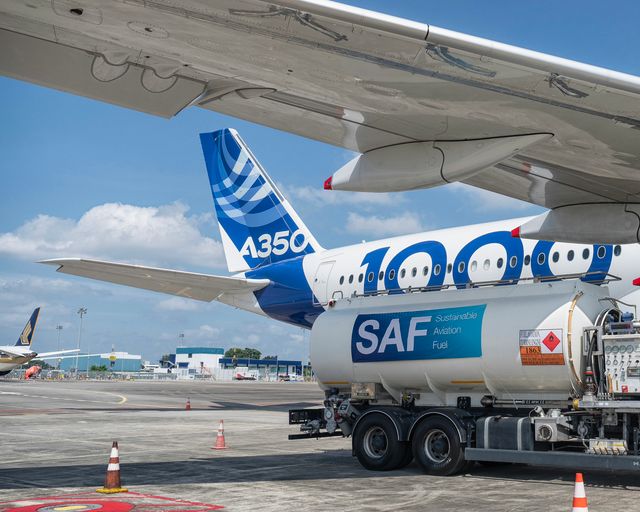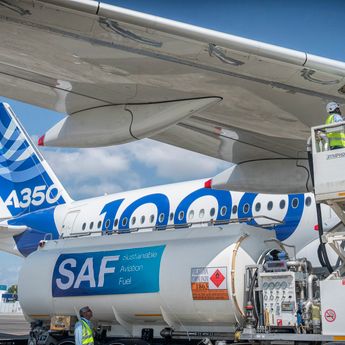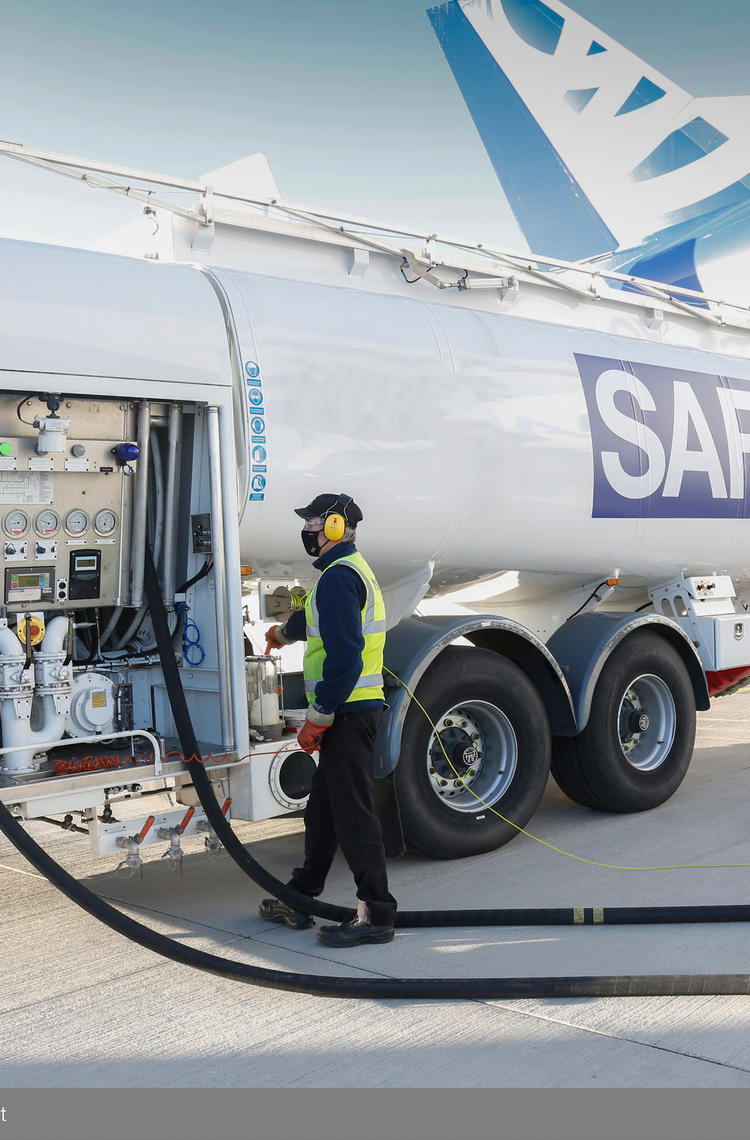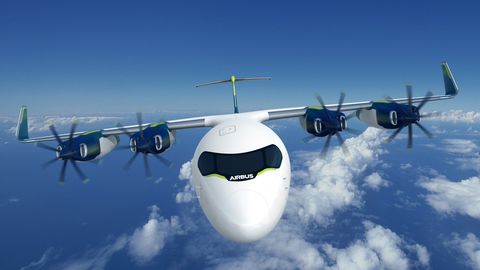What is sustainable aviation fuel (SAF)?
For almost a century, aircraft have been fueled by kerosene. Now, a new generation of sustainable aviation fuels has the potential to halve the aviation industry’s carbon emissions by 2050.
Sustainable aviation fuel (SAF) is certified jet fuel (Jet-A/A1). However, unlike traditional jet fuel fully derived from fossil resources, today's SAF is a blend of conventional fossil fuel and synthetic components made from a range of renewable “feedstock” (such as used cooking oils, fats, plant oils, municipal, agricultural and forestry waste).
All Airbus aircraft are capable of flying on a maximum 50% blend of SAF and conventional fuel. However, by 2030, all our aircraft and helicopters will be capable of flying with up to 100% SAF.
ASTM International, a global standards and testing body, has approved eight technical pathways for producing SAF. Each pathway has its own set of requirements based on different feedstocks and conversion processes.
How is SAF made?
Here are just three of the most common pathways:
- HEFA (Hydrotreated Esters and Fatty Acids): The HEFA process refines vegetable oils, waste oils, or fats into SAF through hydrotreating and hydroprocessing.
- Alcohol to Jet: Alcohol to Jet (AtJ) converts alcohols such as ethanol and iso-butanol into SAF by removing the oxygen and linking the molecules together.
- eFuels: SAF can be produced using green hydrogen, capturing carbon dioxide, and using renewable electricity to create synthetic fuels. This type of SAF is sometimes referred to as eFuel or Power-to-Liquid (PtL).

How does SAF reduce the aviation industry's carbon footprint?
Air transport represents approximately 2-3% of global human-induced GHG emissions. SAF is one of the means the aviation industry is using to reduce that carbon footprint.
On average, SAF can reduce CO2 emissions by 80% compared to traditional jet fuel. This substantial reduction is crucial to the industry’s progress towards decarbonisation.
The key to SAF's impact lies in its life cycle. When burned, SAF still produces emissions similar to those emitted by fossil fuels. But unlike conventional jet fuels, which take fossil resources out of the ground and release previously stored carbon into the atmosphere, SAF primarily uses carbon that is part of the current carbon cycle in various feedstocks. This means that the CO2 emitted during an aircraft's flight is re-absorbed by the biomass used in SAF production.
1 - What is SAF ?
Sustainable aviation fuel (SAF) is a renewable jet fuel that can reduce CO2 emissions by 80% on average and is being developed to eventually power aircraft with up to 100% SAF, without the need for blending with fossil fuels. This video illustrates what SAF is and its use in aircraft today.

What challenges are delaying SAF uptake?
The SAF ecosystem is in its infancy. In 2023, SAF volumes reached over 600 million litres (0.5Mt), double the 300 million litres (0.25 Mt) produced in 2022 but still only amounting to 0.2% of all aviation fuel for the year. Limited volumes mean SAF is much more expensive than conventional jet fuel.
As production expands SAF will likely be able to compete on price, but this is not a given; it requires collaboration between governments, industry and regulators on a global scale.
Appropriate regulatory mechanisms and inventive structures still need to be put in place, and even then, there are challenges associated with the limited availability of land and biowaste.
As the SAF ecosystem matures, it is expected that multiple pathways utilising the most regionally appropriate feedstocks will be established. It is clear that both biomass sources and eFuels will be necessary to meet demand.
What is Airbus doing to increase SAF usage?
Airbus is increasing the use of SAF in its own operations, with a target of 15% SAF in our global fuel mix by the end of 2024 and at least 30% by 2030.
We have been accompanying our customers in their own reduced emissions journey, giving them the option to fuel their new aircraft with SAF since 2016.
Airbus is conducting flight tests with 100% SAF, exploring the impact of SAF emissions (both contrails and non-CO2) on the atmosphere.
The Airbus employee travel policy offers SAF to airlines for all employee business travel and we fuel our shuttle flights with SAF when the aircraft is fuelled on Airbus premises and where SAF is available.
Airbus supports the large-scale development of SAF and has been actively engaged in certification processes and demonstration projects. We collaborate with airlines, airports, SAF producers and research institutions around the world to help advance the SAF ecosystem, addressing the policy and regulatory environment and the drivers of supply and demand.

This is a modal window.
The latest in SAF
In the spotlight
-

Stories Innovation
Improving the world we live in with AI-powered products
Some Airbus space products help address land use issues by using artificial intelligence to improve satellite imagery analysis. -

Press releases Innovation
Airbus accelerates Sustainable Aviation Fuel (SAF) adoption with book and claim
-

Press releases Innovation
PACIFIC, a new European project led by Airbus, will advance research on contrail…
-
Press Release Sustainability
Airbus signs MoU to collaborate on pure Japan-domestic wood-based SAF
-

Stories Defence
A330 MRTT: the evolution of the world's leading air-to-air refuelling tanker




